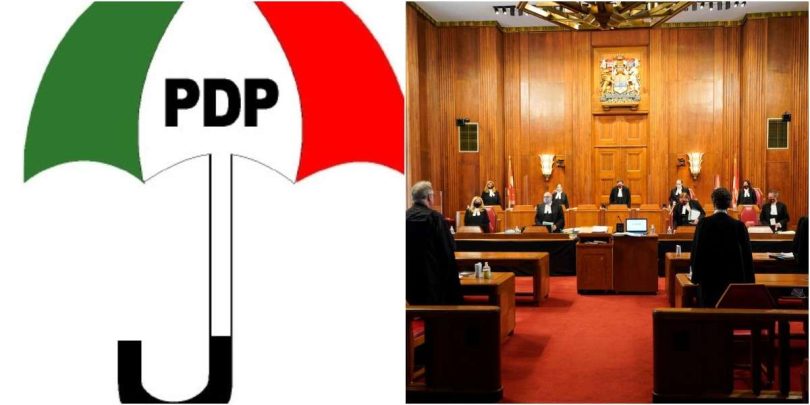The Peoples Democratic Party (PDP) has condemned a Canadian court ruling that declared Nigeria’s two major political parties, the PDP and the ruling All Progressives Congress (APC), as terrorist organisations.
The party described the verdict as “misinformed, biased, and lacking evidence” and urged that it be dismissed outright.
The decision also resulted in the denial of asylum to Douglas Egharevba, a former member of both parties, due to his decade-long political affiliations.
The Federal Court of Canada upheld the findings of the Immigration Appeal Division (IAD), which had previously ruled Egharevba inadmissible under Canada’s Immigration and Refugee Protection Act (IRPA).
Court records showed that Egharevba was a PDP member from 1999 to 2007 before joining the APC, where he remained until 2017.
Upon moving to Canada in September 2017, he disclosed his political history, prompting Canadian authorities to flag him. Intelligence reports cited links between both parties and electoral violence, including politically motivated killings.
The IAD relied on evidence of PDP activities during the 2003 state elections and 2004 local government polls, alleging ballot stuffing, voter intimidation, and violence against opposition supporters.
Justice Phuong Ngo noted that mere membership in an organisation associated with terrorism or democratic subversion is sufficient to trigger inadmissibility under Canadian law, even without proof of personal involvement.
Speaking exclusively to Vanguard, PDP Deputy National Youth Leader, Timothy Osadolor, said the ruling was unfounded and unjustified.
He stressed that Nigeria and Canada are both democracies, and such claims should be handled with caution.
“Nigeria and Canada are both democracies. And I’m sure those who make such statements enjoy their right to freedom of speech. But again, when having freedom of speech, one should be circumspect about unguarded and unnecessary statements,” Osadolor said.
Osadolor clarified that while there may be individuals with questionable ties within the APC-led government, it was wrong to label entire political parties as terrorist organisations.
“If they wanted to say that some individuals in the government, particularly the APC government, have traces to terrorism, like we all are aware where the last Boko Haram leader was caught in one of the prominent members of this government’s apartment house, they will have a case. And I would say, yes, those individuals have ties to terrorists and terrorist organisations. But to say an entire political party is a terrorist organisation is wrong,” he added.
Former NNPC spokesperson Olufemi Soneye warned that the Canadian ruling sets a dangerous precedent by equating political affiliation with terrorism.
He said the decision risks stigmatizing Nigerians abroad, potentially affecting visas, asylum claims, and political participation.
“For Nigerians abroad, especially those who have ever held a party membership card, it signals heightened scrutiny, denied visas, and rejected asylum claims not only in Canada but potentially in other Western democracies that may follow suit,” he said.
Soneye added that labeling established political parties as terrorist organisations undermines democracy.
“Even more alarming is what this means for democracy. Labeling established political parties as terrorist organizations undermines their legitimacy at home and abroad. It blurs the vital line between dissent and danger, between governance and extremism. Once such a label is applied, it can be wielded, domestically or internationally as a tool to silence opposition, suppress political participation, and erode civil liberties.”
“Terrorism is a grave charge. To weaponize it against political organizations that have governed a democracy for decades is to dilute the meaning of the term and cheapen the fight against genuine extremists. It also blurs the essential boundary between political disagreement and criminal threat, a boundary that safeguards democratic life.”
He further warned that the ruling could have direct consequences for Nigerian youths, saying: “One immediate consequence of the Canadian ruling is that law-abiding Nigerian youths, both at home and across the diaspora could be branded ‘terrorist’ solely for past or present affiliation with the APC or PDP. I know for a fact that the immigration laws of the US and Canada allow inadmissibility based on membership in a group deemed terrorist. This creates a real risk of collateral stigma for young people whose involvement was purely civic. The prospect of visa denials, asylum rejections, or routine travel scrutiny will chill legitimate political participation among youths who are the lifeblood of party renewal. Far from strengthening democracy, such deterrence erodes pluralism by pushing emerging voices out of mainstream politics.”
“The world should take note: when courts begin deciding which foreign political parties are ‘terrorists,’ the erosion of democracy is no longer theoretical, it has begun. This is not merely Canada’s internal immigration matter. If the definition of terrorism can be stretched to encompass mainstream political organizations in one of Africa’s largest democracies, then no political movement anywhere is safe from being redefined into illegitimacy.”
“Canada’s decision is not just about Douglas Egharevba, it’s about the dangerous precedent it sets. And if democratic nations don’t push back on this kind of overreach, they may one day find their own politics on trial in a foreign court,” he concluded.

